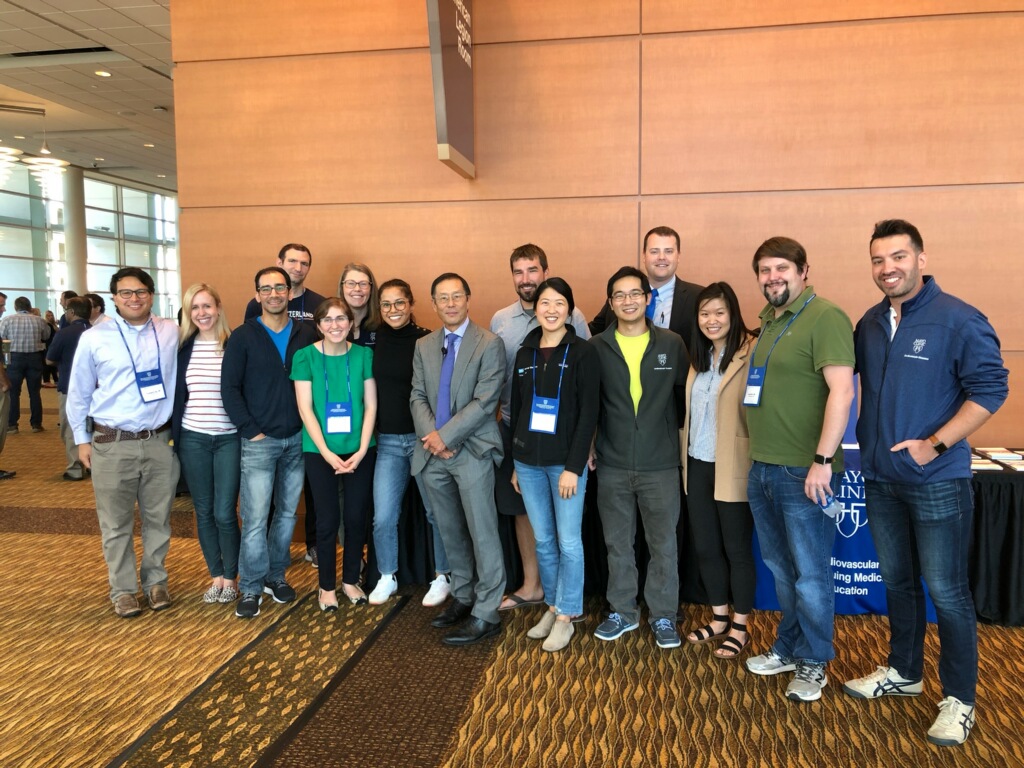Goodbye Self-Inflicted Intimidation and Hello Learning: A fellow’s experience working with Dr. Rick Nishimura

“Don’t speak out, you may answer incorrectly and embarrass yourself.” This thought was not uncommon during my first two years of fellowship. Yes, I evolved out of this which is why I am sharing my experience. At the same time, I am here to tell you to not make this mistake early in fellowship.
You may or may not have heard of Dr. Rick Nishimura, a master clinician, and educator of cardiovascular hemodynamics. You may have seen his name authored in many of the national guidelines or his face at national and international conferences. Now, imagine him (or your own respective master clinician-educator at your own program) leading weekly hemodynamic sessions and asking escalating difficult questions to the audience. Would you answer? How confident would you need to be to articulate this out loud?
I am about a month away from completing my general cardiology fellowship (my 3 years were slightly extended from two maternity leaves) and I have had time to reflect on my clinical experience. I remember my first year sitting in our auditorium and can vividly recall answering a question about x and y descents incorrectly in front of everyone. I rarely spoke out again for the rest of that year.
As a third-year at the Mayo Clinic, I had the opportunity to work in “Nish” clinic amongst a handful of other fellows and participate in his hemodynamic sessions. Every fellow before me, alongside me, and after me all feel the same way: to work with him requires a great deal of preparation and meticulous chart review of patients, repetitive review of all the guidelines, and an attempt at reading published research relevant to each case. The more I thought about it, it became clear that I had a unique opportunity to challenge myself before graduating. I’m glad I did.
I’d like to share reflections, learning pearls, and takeaways from my experience working with and learning from Dr. Nishimura:
- Find passionate clinician educators early in training and don’t be timid about learning from them.
The way he lectures to hundreds of people in a room is the exact way he teaches you and it is incredibly motivating. By explaining complicated pathophysiology with such simplicity, I became deeply entrenched in the learning process. I cannot overemphasize the hours I spent preparing for the potential questions he might ask yet I still left clinic with at least 4+ things to look up, feeling inspired and motivated to be a better learner and educator. This is the art of teaching.
- Do a good physical exam and use it to determine whether the rest of the workup is concordant or discordant.
One example I learned was the location of the P2 component of S2 on the chest can tell you the degree of elevated pulmonary pressure.
- Look at the data (i.e. echocardiograms) yourself.
Avoid only reading reports as they can sometimes mislead you into making life-altering management decisions for patients. For example, do not accept pulmonary artery systolic pressures without looking at the tricuspid valve regurgitant Doppler profile yourself. Confirm if this was measured correctly because it can change management.
- Know the guidelines but understand that not all patients fit perfectly in them.
An elderly woman with severe aortic stenosis may be eligible for both SAVR and TAVI, which stresses the importance of individualization and shared decision-making with the patient and heart valve team.
- Communication with the referring provider and follow up with the patient cannot be overstated.
Reaching out to referring providers via letter and phone will develop your communication skills, professionalism, and collaborations. Following up with the patient is not only the right thing to do but also allows you to learn whether your management decision resulted in the best outcome for your patient or if there is a learning opportunity for the next patient who presents similarly.
- Teach one another.
Create an environment where you are sharing cases with your co-fellows and colleagues and practice teaching to one another with the hope that one day with dedication you will also inspire trainees.
- Lastly, do not be afraid to ask questions and answer questions. Even when you are intimidated.
I eventually told Dr. Nishimura how intimidated I initially felt. If you haven’t had the privilege of meeting him, he is one of the most down-to-earth and welcoming teachers you will ever come across. He laughed and said there was nothing to be intimidated about. Many of the questions you have in your head are also questions others have. In that light, more learning, engaging, and teaching can occur if you allow yourself to.
“The views, opinions and positions expressed within this blog are those of the author(s) alone and do not represent those of the American Heart Association. The accuracy, completeness and validity of any statements made within this article are not guaranteed. We accept no liability for any errors, omissions or representations. The copyright of this content belongs to the author and any liability with regards to infringement of intellectual property rights remains with them. The Early Career Voice blog is not intended to provide medical advice or treatment. Only your healthcare provider can provide that. The American Heart Association recommends that you consult your healthcare provider regarding your personal health matters. If you think you are having a heart attack, stroke or another emergency, please call 911 immediately.”